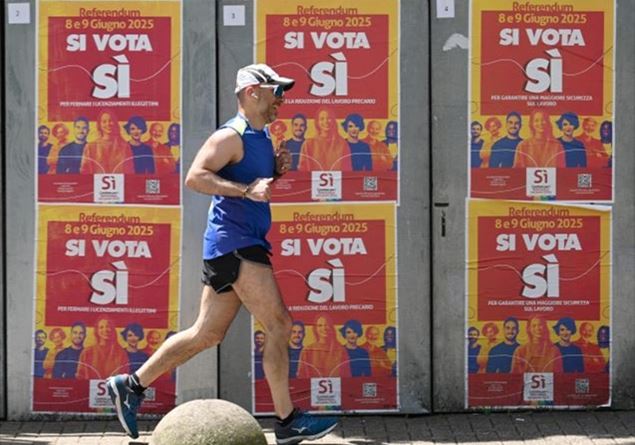You can see more if I go to vote in the referendum, if I don’t go there, if I go there and do not withdraw the card? The variables of the behaviors declared by politicians in view of the referendum with five questions, 4 at work and one on citizenship, of 8-9 June, could also suggest that the verse is made to a lucky and very recycled cinematographic joke. In particular, the statement of the Prime Minister who announced is discussing: “I will go to vote but I will not withdraw the cards”. Since the theme is serious, we asked the Professor Francesco Rigano, professor of constitutional law and constitutional justice and fundamental rights at the University of Pavia to help us understand.
Professor Rigano let’s start from here: is the vote a right, a duty or both things?
«In the Constitution the vote is qualified both as a right and as a civic duty. This apparent contradiction has been interpreted by the most authoritative scholars as a faculty left to the legislator to decide according to historical moments if it should be understood as a duty or as a right that, as such, may not be exercised. Until 1993 there was a rule that provided that the exercise of the vote was an obligation to which the citizen could not escape without a duty to the country. There was also a precise sanction: the mention on the certificate of good conduct on which it was written: “He did not vote”. Today the certificate no longer exists and not even that provision: it has replaced it a 1993 law that limits itself to saying that the vote is a right of all citizens. But it is true that its exercise also represents a civic duty by virtue of article 48 of the Constitution “.
At this moment the theme is current for the abrogative referendum. What is the quorum and why can it affect the choice to vote or not?
«Because an abrogative referendum (one wonders whether to remove a law ed) is valid, it is necessary that it will vote for 50%+1 of those entitled, that is, citizens with voting rights. This is the case of the 5 questions of 8-9 June. If 50% +1 one of those who have the right goes to vote, wins the yes or no, on the basis of those who get the most votes. If, on the other hand, half +1 does not go, you do not reach the “constitutive quorum”, that is, the absolute majority of the valid votes, and the referendum procedure stops: the ballot is still done for reasons of “political suggestion”, but without legal effects “.
The affirmation of the Prime Minister is discussing. How to read it in the light of the Constitution?
«From a constitutional point of view I would say that it is not entirely correct, because presenting yourself physically at the seat and not withdrawing the cards means not having gone to vote. This is certainly legitimate, but not entirely transparent. Saying: “I’m not going to vote” would have been clearer. Do not withdraw the cards, how not to vote, in the case of abrogative referendum is a way of helping to miss the quorum, to express one’s dissent to the consultation itself. This is also a right and can also be exercised in a selective way: an elector can decide to vote on the four questions at work and not to do it to the one on citizenship and vice versa or say no to a single card ».
On the part of those who cover institutional roles, is it not a bad example to encourage abstention?
“Being abrogative referendum, the theme of abstention has a different meaning than the political or administrative elections: here it is a way of supporting the fact that on the theme of the referendum there was no interest and that therefore it would not have been the case to propose it. The bad example, if anything, is in “cunning”, in the mischievous remedy to show that you go to the seat, but without voting: a citizen may not understand well ».
Not in all referendums there is the quorum, when it comes to approving a constitutional reform there is no. Is it worth a different reasoning there?
“In this case, the logic of opportunism changes its own. When a constitutional revision law is approved with double reading in Parliament with a majority between half +1 and 2/3, citizens can be requested. It will most likely be the case of the reform known as “separation of magistrates’ careers”. In this case, an approval referendum is made and the votes are valid, regardless of the number of people who go to the seat: yes or no and there are no quorum. In this case, during the opportunist, the arrow of the “non -vote” is missing: if I am against the reform and I do not participate in the referendum, not only I do not make the consultation fail, but risk of contributing to the success of the favorable “.











